It’s ironic, I’ve lived with chronic pain for at least 7 years…but didn’t know it.
A few months ago, I read the radiologist’s report of an MRI for my left hip. I had my hip scanned as I thought I had a torn labrum but the imaging told a different story. Labrum (the cartilage rim on the edge of the cup side of the hip joint)? What labrum? The joint is decimated. It looks like someone went in with an ice pick and chipped, flaked, abraded and destroyed my coxal (hip) joint.
- Inflammation, check.
- Osteoarthritis, check.
- Bone cysts, check.
- Chondromalacia, check.
- Bone spurs, check.
My orthopedist further translated for me: I am a perfect candidate for total hip replacement.
Total?
My hip will be totally replaced.
When my orthopedist did a standard range of motion test on me, he rolled my right hip around in the socket like it was a pinwheel in the breeze. My left hip traced a similar path, but was 20% less the range. He contemplated out loud…”well, there’s your pre-existing condition right there.” We locked eyes and mouthed the words at the same time, “hip hypermobility.”
Inside my brain and body, I whisked through a timeline that scrolled through decades of dance, yoga, fitness and all the things I did to stretch myself into exhilarated states or mental quiet. I started to confess to my surgeon my own self-diagnosis of “overuse,” but cut my monologue off. He’s the fixer, not the detective.
But the detector in me is now on a new mission to sift through the decades of my life and identify moments of crisis where I think my movement patterns, or my emotional patterns pushed me to move to a threshold with such vehement regularity that I remodeled a hip that ultimately couldn’t survive the assault.
My therapist tried to stop me from further blaming myself for my chronic hip pain. “Perhaps it’s genetic,” he said. “No one in my family has had their hips replaced. I built this city,” I insisted. My pre-existing genetic condition was to move and stretch myself compulsively to stifle the emotional stresses I felt as a constant in my body. I’m not enough, not perfect enough, not smart enough, not nice enough, not pretty enough, not worthy. My yoga and stretching could quiet me like a quart of bourbon could silence my ancestors. It could take off just enough of the edge to get by. But I was building a new edge. I built an irregular surface with organic stalagmites and stalactites that mismatched one another. New body teeth that chewed through synovial membranes…the gums and saliva of my hip joint. My need to grind out my frustration wore a new pattern of tread into a hip capsule made fragile by multiple ankle injuries in my teens and twenties. My pre-existing condition was a belief that I could do more, be more and accomplish more if only I did more. More was more and I needed to move constantly upon that moor in order to survive my life.
When did I first feel the real pain? Somehow I was led to stop stretching myself from limb to limb around 2003/4. That was when I consciously named my work Yoga Tune Up® and pulled back on a practice of daily asana (yoga poses). I turned to anatomy texts instead of yogic texts for information. I started working on the particulars of my movements. I had to re-examine my addiction to stretching. My dependency on my yoga practice was shackling me to the mat and consuming up to 2 hours every morning, if I didn’t practice, I didn’t feel right in my skin. Going without my ritual left me feeling unhinged, irritable and anxious. My need to stretch was no longer expanding my mind, it had trapped it.
Tune in for part 2 of this series, where I examine the mysterious behavior of chronic pain. I ponder how imaging, diagnosis and embodied experience can often be completely out of step with one another.
Follow my hip surgery journey on INSTA or FB with this hashtag #TheRollReModel
Liked this article? Read It’s A Pain in The Core! Life After Spinal Surgery
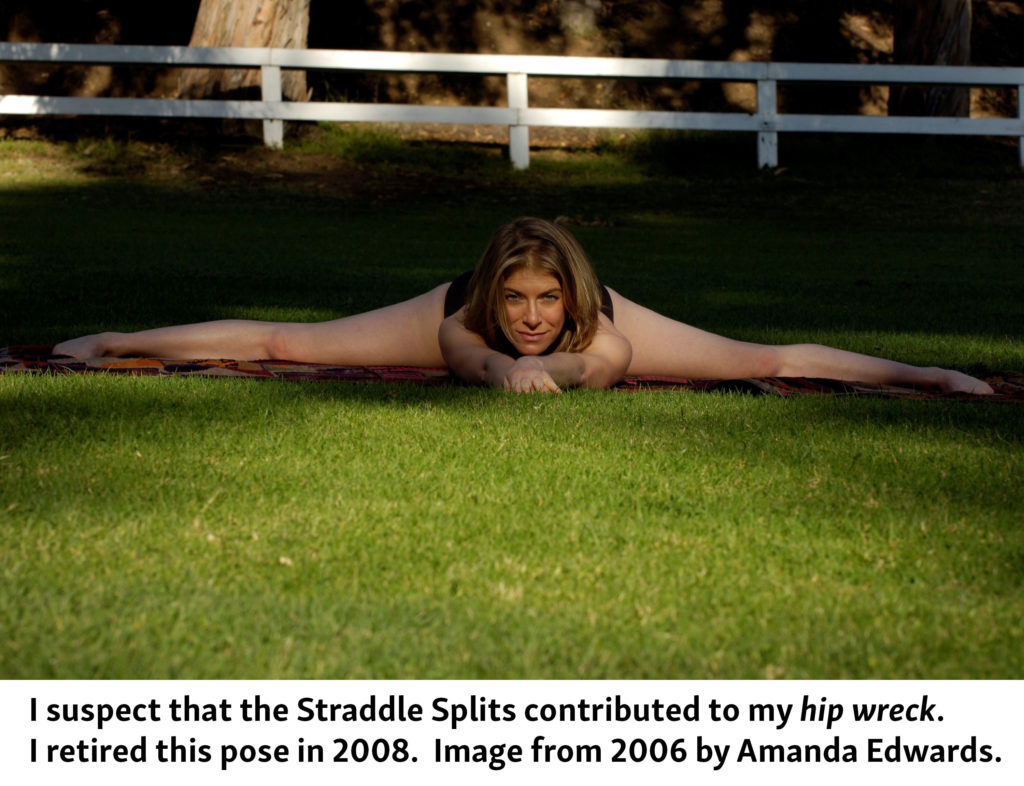
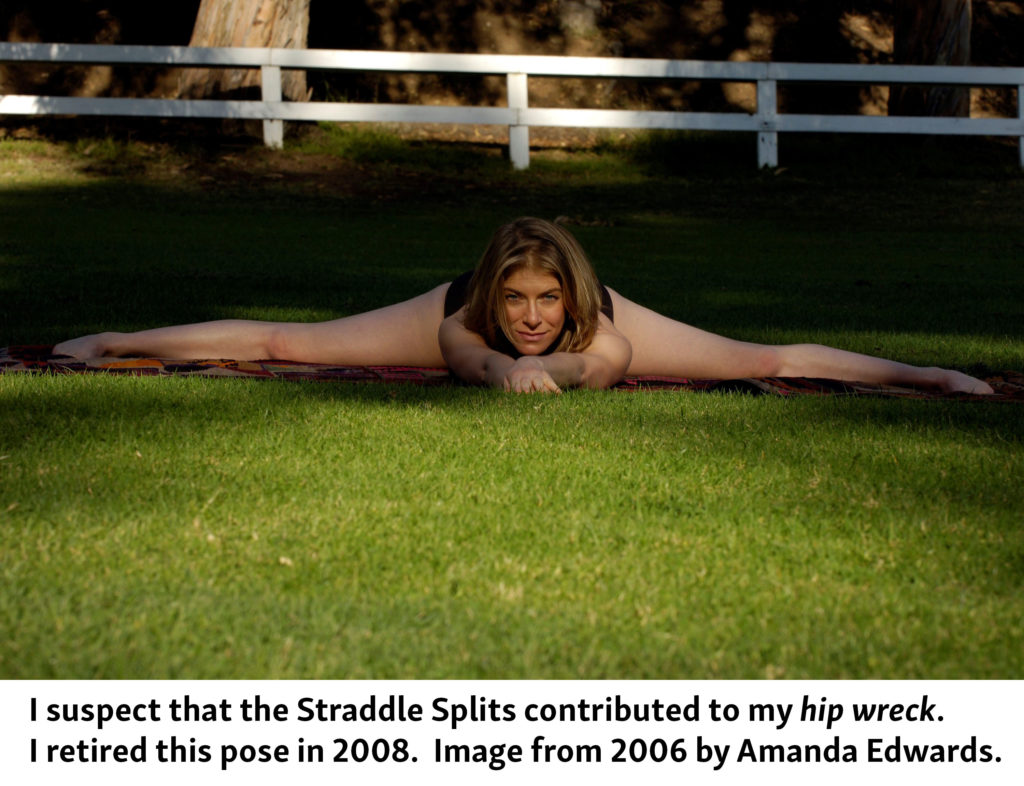
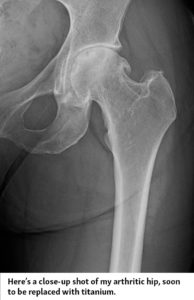



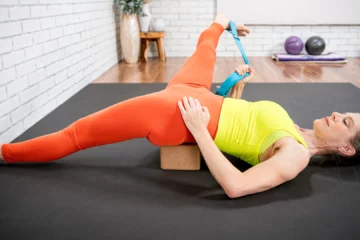
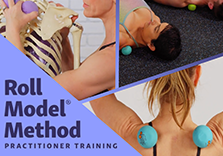
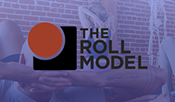



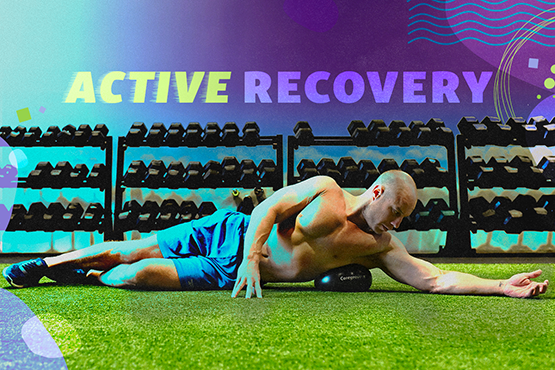
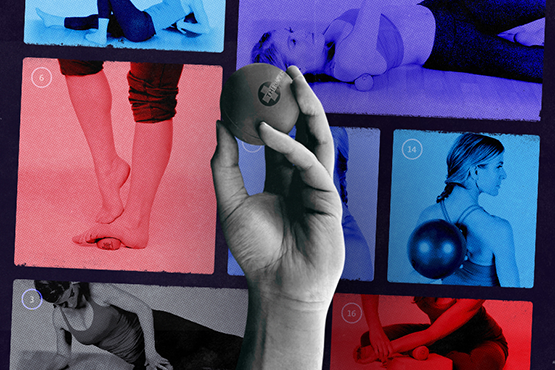
Parfois nous maltraitons notre corps pour des raisons souvent enfouies au plus profond de nous. Nous devrions plutôt l’honorer et écouter ses signaux. Je me rend compte que le regard que j’ai sur moi même est aussi maltraitant…je me trouve moi aussi pas assez …et ce n’est pas d’aujourd’hui malheureusement. Je suis tellement contente que le yoga tune up est venu à moi ….Il va m’accompagner dans mon corps mais pas seulement car pour moi c’est aussi une manière de penser, de raisonner, de vivre, d’explorer …
Your experience resonates with me on many levels, and I believe that many other movement educators also battle with detrimental emotional and movement patterns, whether they are conscious of it or not. Unhealthy body image exists in the health and wellness industry but is not often called out. Yoga/fitness instructors, just like dancers, are conditioned to believe that we need to look like gumbi performing Scorpion Pose on the edge of a cliff over the sea… and if we can’t reach that ideal than we are lesser teachers– and humans. Thank you for raising awareness about this topic that is overlooked and denied.
Personally, I can check three on your list. Inflammation, check. Osteoarthritis, check. Bone cysts, check. Hip replacement candidate since about 2015. As an ex-professional dancer who taught weekly fitness and yoga classes, weekly dance rehearsals, while cycling all over the city to get from one gym/studio to the next. There is osteoarthritis in my family, and I do have it in every joint in my body, but I think I accelerated the process. My transition from the dance world to the yoga/fitness world left me feeling like I needed to prove myself and my flexibility to everyone … as if greater flexibility equated being a better human. Demonstrating every move for every class that I taught (muscle toning, aerobics, power yoga) for too many years left my joints, muscles, and fascia overused, misused, and abused, in the name validating my experience, knowledge, and prowess. And as Jill said, “reaching exhilarating states of flexibility” with my foot around my head… because I didn’t feel “good enough” on the inside.
Overuse, misuse, abuse. The story started long before 2015. Prior to becoming a yoga/fitness instructor, I was a hardcore ashtanga yogi from 1997-2000. I never had the kind of joint mobility or flexibility to get into the true pretzel poses—but boy, did my hamstrings and lumbar spine ever reach new levels. After two years of regular mysore practice, the lifelong drastic hip asymmetry (more external rotation in the left hip, more internal rotation in the right hip) didn’t resolve but my hips sure gained lots of extra range of motion in flexion, extension, abduction, adduction, internal and external rotation all at the expense of my tired, worn out, ball-and-socket synovial hip joint.
As a movement educator, my intention (Sankalpa) is to provide a space where my teacher trainees and students learn tools to help them flick the switch from toxic body talk to self-love, from feeling powerless to being empowered in one’s skin, and to live in their bodies with a sense of security and confidence. Yoga Tune-Up® certainly is packed with intelligent practices backed by lots tender-loving care that literally give students the tools they need for a fabulous physical and emotional tune up.
I understand the “addiction to stretching”. Thanks for the Yoga Tune Up approach to change my vision of movements.
Thank you for this information. Recent hip replacement patient looking forward to strengthening my hips.
Thanks for this testimony. This makes sense to me. For a long time I had questioned traditional yoga. More particularly repetitive stretching. Today with YTU, I understand better why I do a posture and how to do it so that it is functional to my morphology. I hope I can share YTU with lots of other people
Thanks for being so open and sharing this story with us all. Its incredibly enlightening and humbling.
Thank you for sharing. You are a guide. It is very difficult for me as a practitioner and a teacher to try to begin to understand varying degrees of range of motion and how all the biomechanics and kinetics are affecting us in yoga postures. It is causing me a bit of burnout, but you are a great example of investigating.
As a fellow yogi who has had bilateral hip replacement, I support you and feel you.My hips replacements were not due to yoga but do to dysplasia, hyper mobility and over use (running, gymnastics and high impact aerobics). But, it was theist thing I ever did and gave me my life back.
I’m questioning whether I over stretch after reading this article. I am learning the importance of listening to your body. I always had this “no pain no gain” mantra,” but after becoming more aware about the anatomy of the body, this mantra can really do harm. What would you do differently after being more intune with your body? Is there anything you could’ve done to prevent the hip replacement? Could you still do the poses but incorporate strength exercises? I find it very difficult to remove certain poses from my yoga practice.
How relatable is this article to everyone? If I don’t workout today I will be less fit then the day before, if I don’t stretch I will be less of a yogi- or if I use props as a teacher, what kind of yoga teacher does that make me. So much blame and negative talk flows through our brains and Jill, your example hits so close to home. We ruin ourselves trying to be enough for our internal daily monologues. I have to practice what I preach sometimes, and if I learned anything at my YTU teacher training (which was one of the biggest learning experiences thus far as a professional) its that it is okay to SLOW DOWN, BREATHE, LISTEN TO YOUR BODY AND LEARN! I am a student of my body, I am a student of what I teach is with me everyday now and if I don’t do a CrossFit workout rx, I don’t have to beat myself, or my body up for it anymore so thank you for saving some people before they hit this point!
It is scary to think about what we use as crutches some times. On the outside; not all ‘addictions’ look or seem unhealthy. But even in our movement practices, we need to be careful. We need to understand the motive behind our movement, and when we should scale back. Once again, thank you for your openness in sharing your journey.
Thank you for sharing this, Jill. It’s because of your and other seasoned yogis’ openness and honesty about their experiences in their bodies with over-stretching that helped me see the light only a few years into my yoga practice. I don’t know what kind of damage I’ve done from ballet and jazz, and even those initial years of intense daily Ashtanga, but I’m glad that there is more information available now and that practitioners and teachers are opening up about what that kind of physical obsession can actually do to our bodies.
Your story is all too common. So many seasoned practitioners with a dedicated practice have found themselves in similar predicaments. Thanks for shining light on this important issue.
Hi Jill,
I just had a total hip replacement two weeks ago.
I was a professional ballet dancer and have been teaching yoga for 30 years.
My surgeon said told me my yoga gave me another 20 years with bone on bone arthritis
My dear friend , Joann Burhman suggested I contact you .
I’ve listened to your podcasts and interviews, and share your story almost to the tee.
It’s not easy.
I’d love to hear what poses you retired and about your rehab.
I had a rough two weeks, see my doctor tomorrow to remove staples and see how things went.
I’m optimistic and soooo happy it’s over!
Much love and light to you!
I didn’t realize hypermobility was thing, let lone that it can do damage on the body. Also thank you for sharing your emotional relationship with your practice through all of this. I often find that my reasoning for practicing yoga and pilates is to improve my mobility because I have that dangerous belief that “I am not [mobile] enough” (my goal is to have ninja-like mobility). It’s good to remember and believe that you are always enough, as you are, right now.
Thank you for sharing your story in a very honest way.
We all tend to gravitate to poses we like and need to acknowledge our limitations.
Thanks Jill for sharing your story. It’s humbling and inspiring that through our greatest challenges come the biggest transformations.
Congratulations on being able to keep your boat a float 🙂
Though it’s a bit less shocking to read this now compared with when I first heard your news of a need for hip replacement surgery, maybe a year ago or so, this message telling us to get curious is still so very needed in the yoga and fitness world! I sometimes worry that I’m not teaching ‘traditional’ yoga, and it’s deviating further from that expectation now that I’ve completed my YTU Level one course. I literally stop classes in the middle of a pose, give an exaggerated example of someone throwing their body into a form without using their innate wisdom, and ask? Why are you doing this? What do you hope to get out of it? And this week I realized that that’s what makes this training different. The ‘why’, is why I was drawn to it in the first place! I need a reason to do something once- but I need a really good reason to practice something regularly. So as I sit on this precipice, I can feel the “I don’t reeally give a f€<# if I’m not teaching traditional yoga” start to take hold! This is a way of teaching I can get behind, flourish in, and really embody. Thanks for allowing us to learn from your body blind spots Jill 🙂
Impressive!!
Thank you for the candid article. Looking around my own local community, I noticed that one of the reasons why so many yogis are preoccupied by the yogic body image, is that they somehow tends to believe (without questioning, or doubting) that this is the path to follow and the mastering poses are the proof of their dedication. It seems they yearn for the accomplishment that temporary cancel out their psychological or emotional stress about self image.
For yoga practice or any physical exercises, basic scientific knowledge is crucial. Yet even having that knowledge, we are often blinded by the conflicting emotions. I think the teaching of yoga that yoga is more than getting into certain postures, is worth reminding repeatedly. Yoga should serve as a tool to bring wellness instead of harming ourselves.
Thank you for sharing your such personal insight “… stifle the emotional stresses I felt as a constant in my body. I’m not enough, not perfect enough, not smart enough, not nice enough, not pretty enough, not worthy” I relate to this “not … enough” feeling so much.
Yesterday was the first day of YTU Level 1 Training. My Sankalpa was “I have enough Love and Passion for myself and others”. After I reading this article, a slightly different angle “I have enough Love and Compassion for others and myself” which brought me to teaching of Yama and Niyama.
This article definitely made me think of how I could be contributing to my own bodies pain and down the line how important it is to learn from pain and experience in my own body. This also helps me understand my clients better and why it is so important to consider what activities are breaking down the body and which ones are building up the body.
our hip flexors are the engine through which our body moves. They control balance, our ability to sit, stand, twist, reach, bend, walk and step.
Everything goes through the hips.
And when our hip flexors tighten it causes a lot of problems in ordinarily healthy and active people, like us. so theres a list of specialised exercise that can help to strengh the muscle in that area and eliminate this problem. check it out https://bit.ly/2JtvV7L
I really admire your honesty with yourself and for sharing it with others. I think we all, tend to repeat and overdo certain poses depending on our body type but its worth us all taking a step back and asking ourselves why, and if it serves us in the long run.
Such a brave and candid account of how Jill ‘built this city’ in her own body.
It’s a great reminder that it’s not the end of the world to not be able to achieve the classical yoga positions and a wide reaching message to practitioners of all sports/fitness/movement that repetition is not always the best answer and variation is good practice.
I love this article Jill! Shows how you went from being a slave of your body to a student of your body, something we can all learn from.
Coming from dance background, we are trained to put our bodies in an unnatural shape. I’ve seen countless dancers with total hips and knees replacements. We were trained to stretch and overstretch every joints. One of the things that I found in YTU class is bringing it back to normal, human shape without over-stressing the joints.
What an amazing post. I so appreciate the honesty and realism of this blog post. As a former dancer dealing with a problematic hip it’s very comforting to read about someone who has gone through this.
For myself, feeling as well that I’m not quite enough…this is a reminder to me that I can’t fill that feeling with an activity or thought that doesn’t directly deal with the feelings that are problematic. Facing my fears head on, although scary is a more authentic response.
Whether it’s food or shopping, drugs or working out excessively…these vices all act as a distraction from the root of the problem.
Hip replacement surgery is the procedure in which you can get rid of the extreme pain. Just check this link and get the further details on hip replacement surgery. http://orthocentreinindia.com/hip-replacement-surgery-in-punjab/
I deeply appreciate the honestly and vulnerability. Especially coming from a trusting source for bio mechanics. I am left with the message regarding the cautions of yoga and how our current actions are sowing seeds not just for tomorrow but for decades to come. Thank you.
Your honesty towards your reasons for changing your practice are inspiring. I am not hyper-mobile but have been dancing and teaching dance for over 30 years. I was driven by aesthetics which were not possible in my body but continued pushing nevertheless. I just completed the YTU teacher training level 1 and the anatomy component has been my saving grace. It has given me sound reasons for eliminating certain poses in my yoga practice and has calmed certain ambitions I know my body will thank me for.
This is such an interesting time to be a yoga practitioner/instructor. At 56, I feel so young in my body but, at a recent YTU training, “hyper mobile” was a description aimed at me every so often.
20 years of dance and a yoga practice started in highschool, along with a body built for stretch, has given me really flexible hips, though my left hip feels like it has speed bumps when I roll the glute medius. This blog post gives me pause….
Your lifetime of pain ha not been in vain. You have created your life’s work from it and in doing so, helping and healing countless others. Blessings. Deep Bow! ????
Great Article!
As as teacher and studio the biggest challenge is teaching someone who is hyper-mobile. I feel like yoga is undergoing a metamorphosis and certain generations are the guinea pigs to help the younger generations not make the same mistakes over a lifetime of a yoga practice. Yoga alignment is being refined and tailored more and more which is fantastic news for the lasting tradition of yoga in the states. It’s a constant challenge for a hyper mobile individuals to feel their edge in a pose because they are always looking for sensation and feedback in their physical bodies. Most of the popular poses used in today’s yoga are geared towards a stiffer body where a hyper-mobile person needs some very different positions in order to experience physical feedback in the places they need it the most whether it be a place of contraction or expansion. Our daily practices continue to become more and more tailored to the unique individual which a fabulous place to expand and we also create a safer environment in general public classes. So sorry about the hip replacement…I feel for you! Thanks for sharing you passion and impacting lives !
I am excited to read more.
Thank you for sharing your personal story. This isn’t something we hear about everyday. It looks like you are on your way to recovery and hopefully your story will prevent others from doing the same damage. I’m sure we never think it could happen to us. We always want to be the best version of ourselves and push a little too far. I hope you have a full recovery!
Thank you for sharing, Jill!
As a devoted yoga student/teacher with bilateral tears of the hip labrum and arthritis to boot, I can empathize with your journey and commend you for sharing. Truly, it’s been an inspiration to me as one of your new YTU teachers!
Since I’ve started compassionately studying my tendencies to push and exploit my hypermobility, I can’t begin to tell you the number of clients/students that have crossed my path with similar injuries. It’s funny how that happens, right? My pain and struggle have made me an excellent resource and for that I am forever grateful.
At this point in my process, I’m nearly pain free and much of that is due to discovering RMM and YTU. So from my gnarly hips to yours, much metta!
Oh dear… I just read this AND heard your podcast with Andrea Ferretti, and recognised myself completely in your words ….
including the hip pain- looks like mine is quite damaged too- I’ve recently dropped legs behind head poses and feel some relief already…. the over stretching, the addiction to mostly a strong practice (27 years of daily practice at this moment in time, from late teens), the obsessive compulsive need to stretch… the reliance on yoga to fill a void/escape something, the removal of oneself from a normal life ( I don’t do social things in the morning, EVER- or if there’s something important with the kids I just get up even earlier to cram in a practice ), the way one can become anti social if not careful…
and I cried like a banshee.
What have I done! I too believed yoga to be a total panacea, and only now, with injury from overuse, am I realising the folly of pushing myself beyond what my body is built for. ( I’ve already had carpal tunnel surgery! )
A lot of food for thought as I mop up my tears.
Blind faith is….. messy indeed.
Thanks for popping into my consciousness at last…
I’d be interested in training in yoga tune up- do you do any trainings in Australia?
A story that will stay with me as I move through my own body and teach others. Trying to find the balance between something that free’s us from one trap without putting us in another is a powerful message. What are we really doing? Why are we really doing it? To pause and look in the mirror and ask the hard questions is the ultimate practice I guess. Thank you for your openness.
hello my titanium sister! I’m looking forward to part 2. I can hardly believe you withstood the chronic pain. I couldn’t even walk by the time I had mine done and was on tons of medications! Anyone out there contemplating a hip replacement, don’t wait until you’re absolutely debilitated or your rehab will be much longer. stay strong in the gluteals, adductors and abductors. and don’t forget about the pelvic floor muscles! they all become weak. The yoga Tune Up (R) work has propelled me to a level with my yoga practice I couldn’t have imagined post hip replacements.
Fancy bullshit poses that are meant to look sexy in photos and impress other people IS. NOT. YOGA.
This apparently is hard lesson to learn even by so-called experts.
How often the concept of just “moving your body” equals staying healthy. How superficial and general is it. Stories like the above one are real wake up calls. And you are lucky if you heard it sooner than later..
I am experiencing a wake up moment as I read this…I too use fitness as a tool to manage my angst. I, too am convalescing from a surgery and have lost my ability to tap into my “drug of choice” for 4 weeks. I’m apprehensive about what these days will bring for me. I suppose there is noting left to do but turn around a face some demons and wrestle them to the ground. Hulk Smash!!!
Thank you Jill for sharing your story! I was really hooked on to it. It is inspiring and commendable how you have excelled and done so much work in self care. Every time I read about you or your article I learn something new. In today’s world of yoga, being able to twist and turn in all directions qualifies you to be a yoga teacher. I have seen this a lot in my country. We need to spread this awareness of not going crazy over mobility.
Thank you for sharing your personal experience. It really makes one ponder on our own individual practice and if we are practicing ahimsa, tapas and satya in fulfilling ways. And if we are, how important it is to work with the one and only body we get this lifetime and mindful approach. Thank you so much for highlighting that the sheer important of learning our own human anatomy and on the way notice how fascinating this body is.
I think it’s so insightful for you to attribute your “pre-existing condition” to a personality trait rather than your anatomical makeup. So often we forget that we’re hooked up in different ways and that hypermobility isn’t necessarily your body’s way of telling you that because you CAN do something, you should. We forget that our bones are linked by ligaments that aren’t MEANT to be pushed to capacity, that aren’t MEANT to be stretched repeatedly. I think of the images I see on social media, of women who twist and pull themselves into different contorted poses, and I wonder if they can envision what is actually happening in their bodies. What is happening in their joints. I also love how you described the creation of the bone spurs and re-surfacing of hip bone that destroyed your labrum and synovial membranes. So well done.
Hi Jill
Welcome to the club
My diagnosis was “shit happens”
We are a generation of doers, athletes for a lifetime unlike previous generations who stopped in their 20’s (my parents born in 1926)
It is humbling and balancing I try not to through the baby out with the bathwater in my conclusions … in an article I wrote called “the arrogance on Yoga” or for that matter of a generation where we believe that stuff doesnt happen to us. Big surprise and humbling. We live, we age, and eventually we die. I really could not imagine my life without yoga. That is the journey. AND as we age through life we adjust and readjust with the needs and dictates of our life and our body
Btw…its a great recovery enjoy it!
A studio I just taught dance in made their students sit in straddle upon enter the room. They insisted sitting in straddle was making the more flexible and good for them. As I just started in this work, I am excited to see how I can use it in a dance warm-up to still have the same goals of increasing flexibility and aerobic facilitation, but in a safer way!
Hi Jill
I might have written a similar blog, Though much older than you, I teach yoga – mostly ashtanga -and recently had my right hip replaced. I had no problem practicing daily, it was issues with other activities that eventually pushed me to visit the orthopedist. It’s been four months since my right hip was replaced and though my practice is still far from what it was, it’s better that I expected and my ability to perform other activities, such as hiking, biking and tennis is much improved and pain free.
I’m looking forward to reading about your journey.
Namaste!
Bill
Thank you for being so vulnerable with us in your post. Sometimes the very things we use to fix ourselves, can break us. But you have identified it and will move forward in a better way. Good luck with recovery, I can’t wait to see what evolves in your practice from this experience.
Jill, thanks for sharing so openly. I constantly see overstretching and hypermobility in yoga classes. This is a great reminder why styles like YTU, that incorporate more anatomy, strengthening, and proper movement (not just stretching!) are so important to our long-term health and well-being. Thanks again for sharing, looking forward to Part 2!
Hi Jill, I know I’m not the first to say, “me too” here, but me too, and thank you for posting about this. I am 28 and just had hip arthroscopy, arthroplasty, labrum tear repair 1 month ago. Even though this is not a fun experience and it’s been devastating, it has been enlightening. I’m happy I now have you to look up to for guidance on this subject! I searched for anything on this subject 2 months ago and didn’t find much help or understanding out there. Keep sharing your journey, it’s helping 🙂
I was wondering if a 3D joint replacement is an available option for you. I have read that recovery is so much easier, and they ARE being done but do not know where or how prevalent. I know this is not that helpful but planting a seed of “what if”. Best to you!
Hi Jill,
I have enjoyed your teachings and have personally benefited from them as have my personal training clients. I know surgery appears to be the correct choice for your situation. Wondering if you have ever heard of trainer Matt Hsu from San Francisco area. His business Upright Health has a program called FAI FIX. He has helped many women avoid surgery. I wish you all the best in your up coming journey. Peace.
Jill, you have been such an inspiration to me from the first time we met in Glenn’s workshop at Omega (10-ish years ago?)
It has been wonderful watching you pursue your passion and spread the knowledge of self care & simultaneously creating a wonderful business model.
And you continue to inspire me with this candid & courageous narrative about the challenge you are now encountering with your health & hip – elaborating the somatic connection to the mind as well as your unique physiology – forever imparting your wisdom.
Bonne chance with your surgery & “evolved” recovery – which hopefully you will make your mark with – changing it up a bit.
virtual hug
Randy G
Thank you for your ability to share so candidly. It sounds that you see in your own physical body the history reflected from recurring ailments. Your story can help impact the youth in dance and fitness and inspire them to proper care and awareness of balanced training and rest. Great post! ??
I have Ankylosing Spondylitis (inflammatory spinal arthritis), but I’ve been an aerialist for over 15 years. AS is often undiagnosed in women, and you don’t have to have the HLA-B27 gene to have it (I’m negative). For women, AS can cause inflammatory problems in different areas – cervical, ribs, and hips. I sometimes hear stories like this and wonder if this inflammatory condition (or something similar) could have been overlooked. I definitely have hip popping/sliding and have had problems with the more extreme hip openers. Since I knew this was an issue with AS, I’ve known to go more easy on these (and the result has been increasing stability and careful strengthening of the joints). I was just visiting my doctor today, and he told me about another yoga student who went undiagnosed for 20 years. She successfully avoided fusion, but still had lots of bone spurs that finally made her ask, “What is wrong?” He couldn’t figure out how she pushed through the pain for so long. If she had known earlier, she could have taken more steps to halt the progression of spondylitis. Just passing along this advocacy since it often takes 5-10 (and even longer) for someone to reach a diagnosis for Ankylosing Spondylitis. Thanks for this honest insight into the practice. I’m looking forward to your progress and journey, and best wishes for your healing!
I’m astounded at the ability of the human body to both degrade (one hip almost totally destroyed, yikes!) and yet continue to function! We live with such sub-optimal behaviours it’s amazing that we compensate and keep going. This article is so key for people with hypermobility and any kind of mover who pushes the body from sub-optimal non-moving behaviour to sub-optimal overstretched/overuse behaviour! Thanks Jill for continuing to be a role model to all of us, and best of luck with the surgery.
Wow just Wow. I had THR this past June. I am a yoga practitioner/teacher, have practiced and taught martial arts, triathlon, etc. I used my body a lot. The pain started gradually and slowly became my constant companion. Your title is what was told to me: THR or continue with a life of chronic pain and pain meds (refused the meds). THR has changed my life! I had no idea how the pain was completely screwing up my life until it was gone. I now have amazing amounts of energy and am much nicer! The best comment was from my husband who said “I saw you losing yourself because of the pain and it is really nice to have you back!” Thank you for sharing your story and giving us all a voice! Looking forward to part II!
Thank you Jill for your candor and offering your story to the YTU community. Also thank you to the many people who have shared their experience and resources. I believe telling our stories and sharing in this way can help prevent further injury and – of course – we learn from each other. Here is yet another resource many of you may be familiar with: http://matthewremski.com/wordpress/wawadia-main/ Matthew has been carefully compiling data on yoga injuries and myth busting for years now.
I just completed the YTU Level 1 in August and Hip Immersion course last weekend. Coincidentally my hip has been sore the last few days. I wonder if YTU will be adapting/changing its teaching methods?
After I had my dance-related THR in 2003, I started a website for dancers and athletes to share their stories and provide support for others facing this surgery. Please visit dancerhips.com and consider adding your story.
I have had both hips replaced and can tell you that after THR you get your life back.
Thank you for your honesty and your bravery in going public with your “hipstory.” I think you’ll be able to provide incredible support and innovative rehab to the huge number of other yoga teachers, dancers and athletes who are going through the same thing (or will be…). I’m looking forward to hearing more. Best of luck with your journey.
I found the emotional side of this really resonated with me. I think that many of us struggle with anxiety and self belief. I myself have turned to routines as a coping strategy for when I feel worked up, tense and stressed. Maybe we all choose a way of having control in the moment each with varying effects and damage. I wish you a safe operation and speedy recovery. You’re journey and practice has certainly helped me find a less damaging and calmer path.
And what about from 2003 till now. Your body is overextended in so many ways Jill. Best of luck with the surgery. Take care of yourself.
Jill, here is the Study on elite dancers and hip architecture and usage research.
http://www.arthroscopyjournal.org/article/S0749-8063(12)01755-0/abstract
The hip joint is under a lot of stress in straight leg forward bends which drive the head of the femur into the acetabulum while the sockets are misaligned. The laxity created in the femur joint as well as the sacral lumbar lead to a lack of shock absorption during movement. for more information on yoga injuries see this website. http://www.yogainjuries.com
If anyone has been injured from a yoga practice, please take the yoga injury survey.
http://yogalign.com/yoga-injury-survey/
The results will be published soon to help us all understand what poses and practices are leading to these injuries.
Thank you for openly sharing and discussing your hip damage and upcoming joint replacement surgery. Although architecture is certainly a factor in hip osteoarthritis, bone spurs etc., a study comparing the hip joint of young elite dancers to the general public revealed that it was the usage rather than architecture of the joint that leads to these pathologies.
In the next decade, we could see an epidemic of hip issues with women who do yoga and stretch. The glamorization of flexibility by the yoga industry as well as the addictive nature of stretching seem to be major factors. In YogAlign, the practice I have spent the last two decades creating, we stabilize rather than stretch and we practice to create strength and agility rather than random flexibility at the expense of the spine and hip joint. Please check us out at http://www.yogalign.com
Thank you for sharing your experience. I’m curious about your understanding of chronic pain and in particular your statement about having pain about living with pain but not knowing your living with pain. I look forward to hearing more.
You may be interested in this blog post from a wonderful resource website dedicated to improving pain literacy. The author of the post shares about his own recovery hip (and two knees) replacement.
https://noijam.com/2016/02/10/two-knees-and-a-hip/
You and your readers may be interested in checking their understanding of the neurophysiology of pain via this questionnaire:
http://www.bodyinmind.org/resources/pain-assessment-resources/neurophysiology-of-pain-questionnaire/
In health.
This is so similar to my body story. I spent years pulling myself apart in bikram and power vinyasa classes. I was diagnosed with EHLERS DANLOS hypermobility syndrome in 2012 and have been on my quest to wellness, wholeness and understanding of my body since then with the passion and fervor of the reborn. My pain story is so powerful.
Thank you so much for writing this. I have been writing and journaling through this journey. I am a yoga teacher, and have been really concerned by the lack of basic understanding of human anatomy of so many instructors out there, and the push and pull and extreme that so many classes go to. So much of yoga out there is extreme gymnastics and just plain wrong.
Jill,
Thank you for your transparency. I know you aren’t the only yoga teacher dealing with this, but you are one of the few talking about it. I also have what my doctor calls “loosely set” or “uncovered” hips. I was living in constant pain after two years of a daily vinyasa practice. I found the work of Michaelle Edwards and attended a retreat at Kripalu. My asana practice is now very gentle with a focus on strength, stability, and agility rather than flexibility. When I hear yoga teachers says that “we all need to open our hips” I run for the hills. Some of us have very open hips and while those hip openers are so fun at first bc we are “good” at them, they come at a heavy price.
I wish you health and healing. It looks like you’ll be using your challenges to help others avoid the same path. Thank you Jill.
Thank you for the transparency of your journey. Being a role model for many I am sure, this kind of honesty translates to the best kind of authenticity.
Dude. You are a rock star of the highest order. Sharing your story with such unflinching honesty will no doubt save many a hip in the coming years. This article is why I am so proud to be a Yoga Tune Up® teacher and why I am so grateful to have been given the opportunity to call you my teacher. Looking forward to part 2. I will spread this article to as many humans as I can.
How timely! I just scheduled my total hip replacement surgery TODAY for a month away. Just like you, decades of high impact aerobic teaching, yoga, running, and jumping rope barefoot on a concrete floor, coupled with an eating disorder, anxiety, depression, and a family history of arthritis has rendered my right hip useless. I’m tired of masking the pain and powering through like I deserve the punishment. I will miss teaching asana for awhile, but perhaps it is time to focus more on the other 7 limbs of yoga. I look forward to your posts! Christina ERYT age 52
Thank you for sharing so honestly, Jill. As a former professional ballet dancer I can relate to the need to overstretch and overdo for the illusion of attaining perfection. As a yoga and YTU instructor now, I feel it is our responsibility to share our stories. Many students have confessed to pushing their bodies to the limit due to peer pressure within the dance industry or self-imposed discipline — and I often ask, “At what cost?” I’ve found that the best way to connect to these students is by sharing my own personal struggles and offering intelligent approaches to gaining functional mobility, not merely flexibility for flexibility’s sake.
Best luck and rapid healing to you Jill.
You have helped me so much with all your advice….. and tune up balls. I appreciate all you’ve done and all you know, and all I’ve been able to retain as i read your book and practice with dvds. I am impressed by your ability to examine how you’ve contributed to your predicament. So you are still teaching me. With much admiration and appreciation. And hope for your comfort and peace! From connecticut.
Jill,
Reading your article, it sounds like you have FAI (femoral acetabulum impingement) with labral tear, osteoarthritis and bone spurs! How do I know? My husband had these exact symptoms— and your description is nearly the same as his. He is just now 3 weeks post-op from arthroscopic hip reconstruction surgery. He is 49, always been a top athlete and never had any major injuries. His condition is genetic (most FAI are), and the damage was so severe, that his Orthopaedic surgeon (Dr Byrd) said this type of surgery— not replacement— is the only option to retain integrity and mobility of his hip.
We flew to Nashville for the surgery with Dr Thomas Byrd at Nashville Sports Medicine. He is one of the top ortho doctors in the US perforning this surgery, which he wrote the book on!
I urge you to seek a highly specialized Orthopaedic HIP Surgeon before committing to hip replacement, which is a band-aid fix.
Best of luck and namaste ??
I was wondering if there is anything in Yoga Tune Up Fitness that you will change now that things have changed in your practice? I see many teachers who after 15 yrs are changing their tunes and pulling back from what they have always known.
May you heal painlessly and quickly!
Rachel
WOW. i did the SAME. DAMN. THING. i ground my hip to literal mush at the age of 23 from living at yoga and dance studios, trying to stifle the immense anxiety I felt, riding the exercise-induced euphoria until it crept up again. My hip finally collapsed under me while walking down stairs to the subway. Two reconstructive hip surgeries. Arthritis and necrosis. Total hip replacement at 27.
I used to teach yoga. I stopped immediately after that initial injury.
Today, I consider myself “mostly recovered,” and back to nearly everything I love to do, but the metal in my body still heavily informs the choices I make.
Thank you for sharing. It’s helpful to know I’m not alone. <3
Thanks so much, Jill. I’ve often questioned my ability to stretch deeper and concerned myself with not being able to go further in my personal practice. But, when teaching I always say listen to your body, take baby steps, enjoy the ride. You are enough. I look forward to Part 2.
Thank you. I too had a very active lifestyle. Running 30 miles a week, hiit training several times a week, weight lifting and yoga. Did a hike and fell only to discover I had osteoarthritis in my left hip. It winded me to the point of depression hitting me. I wish I knew what I know now. Thank you kindly for you’re article. Very much appreciated.
Sorry to learn of all the damage and pain but glad to learn you are on the path to healing.
I too had a Total Hip Replacement. A Hippy! My lifelong hypermobility was the culprit. Or better put, the unskilled exploration of that hypermobility was the culprit. I have a genetic spectrum disorder called Ehlers Danlos Syndrome. Have you seen a geneticist for an evaluation of this possibility? Worth considering.
As others who’ve had THR, the pain will dramatically decrease immediately after surgery.
For an inspiring process of diagnosis, treatment, and recovery from THR, check out how legendary waterman Laird Hamilton dealt with his THR.
Oy Vey! Thank you for this Jill. I know that urge to chase sensation, chase extremes, in order to distract myself from the discomforts of my humanness oh so well. Just last week I was feeling slightly inadequate, and so made a new declaration to build more muscle, and immediately pulled my back because I was trying to override my physical sensations out of a mental/emotional urge to suddenly be more. This weeks lesson is to be kind and quiet and rest with big cushions behind my back…
I always appreciate your candor, and the fact that you take us on all of your learning journeys with you – even the most intense ones. Wishing you a successful surgery, and lots of comfort along the way. Big love. Ariel
Hi Jill,
I had a total hip 4 months ago at the age of 51. Mine is a result of an adjustment from a yoga teacher which tore my labrum. I first had an arthroscope to repair the torn labrum but it didn’t work, my joint collapsed and I ended up with a total hip. I’m getting stronger and it has been such a journey and learning experience. I am a Yoga Therapist and I think that has helped me heal quickly. I taught 9 classes at 2 weeks post op and my students were shocked. Not crazy power yoga but a strong therapeutic yoga. Good luck feel free to contact me if you have any questions. Dr Snibby is wonderful and you are in good hands.
Very honest direct account, look forward to part 2. Hope the hip op goes well.
Im looking forward to Part 2. Hypermobility is no joke. Wishing you well
Thank you for this great article Jill! I love the way you emphasize on the ”be more, do more, have more”. I am confident that so many people can relate to these words. It’s crazy to think for years we have been doing the best and right things for our body, but in fact have been destroying parts of it.
I look foward for what follows! xx
Hi Jill, Thank you for sharing. It’s interesting to me that when you think your doing all the right things for a healthy body and mind something like your hip deterioration can gradually come on. I know for myself I injured my hip in my 20’s and since then I always work on it’s mobility. Reading your story makes me wonder am I doing the right movements?
I look forward to the follow up post.
Jill, you saved me from breaking my back and derailed my own run away train down the tracks of overuse. With you as my muse, I continue to practice the art of kenesthetic cartography: drawing my own unique embody-map to unearth movement treasures of self-care. You’ve taught me to feel so deeply. You’re a bold pioneer and this latest hip trip will only bring more clarity to your pristine waters. Thank you for captaining our ship.
Hey Jill,
Sorry to hear you need the full replacement. I’m 36 and found out 3 years ago I will need a full replacement in the next few years depending how things go. I have bone cysts and swelling. I can’t think of any known injuries. I was a couch potato until my late 20s and have been lifting weights the last 4 years or so. No one can really predict where mine came from. They just chalk it up to bad genetics. Thank you for sharing your story. I hope the full replacement helps your pain!
Take care!!
Thanks for sharing Jill. I’m sure there are many people out there following the same path you took with stretching, stretching, stretching. I feel tight ……. I should stretch more. No!!! Not necessarily.
Hopefully, your story can bring about more awareness. Best of luck with your surgery and recovery.
Hope all goes well with the surgery. I have been really impressed with your knowledge and the products/information you provide to those who follow you. Hard to integrate that someone like you feels like ‘not enough’ when you seem like so very much to those of us who follow you.
Jill! Hi! Remember me? My mom, Viva? I have a hip labrum tear and have come to all the same conclusions as you. Somehow I did less damage–I think because I am much lazier than you. But reading your article I almost cried and was nauseated in that when you identify so thoroughly with something. Anyway, I just wanted to say hi and send you love. xo
As a daily exerciser I was dismayed at needing a THR.
Best BEST decision I ever made! Back to exercising without pain and getting ready to start yoga and spinning again. Can’t wait
Go for it!
Fantastic piece of writing. It should be required reading for health care workers, yoga teachers, yoga students. Heck every human being should read it. Looking forward to reading part two!!!